Another week on foreign policy, mostly because it has been so heinous lately. The gas attack in Syria was particularly upsetting, in part because there was video footage of the aftermath (unlike in the case of the U.S.’s Al Ghayil raid in Yemen that killed a score of civilians, including nine children, or the bombing in Mosul last week). The Syrian regime, once again, is doing the one thing they do in response to a restive population: kill and torture. They literally know nothing else. That said, there seems to be a universal media consensus that the United States should fly its bombers in there and start blowing the place apart, as if that has ever made anything better over the past 50-60 years. (Spoiler alert: it hasn’t. It has made things exponentially worse.)
 Then there was the missile launch in North Korea. Deliberately provocative, yes, though again, our military rules on that peninsula – we’re constantly running joint exercises with the South Korean military that can only be seen as provocations by Pyongyang. Trump is going to take this up with China this weekend in his cheesy Florida resort getaway, but that just marks a continuation of the same disastrous policy. North Korea wants to talk to us, not China. This only possible way to reduce this massive threat to human existence on the Korean peninsula is provide Pyongyang with some guarantees of non belligerence. That is simply not on the table.
Then there was the missile launch in North Korea. Deliberately provocative, yes, though again, our military rules on that peninsula – we’re constantly running joint exercises with the South Korean military that can only be seen as provocations by Pyongyang. Trump is going to take this up with China this weekend in his cheesy Florida resort getaway, but that just marks a continuation of the same disastrous policy. North Korea wants to talk to us, not China. This only possible way to reduce this massive threat to human existence on the Korean peninsula is provide Pyongyang with some guarantees of non belligerence. That is simply not on the table.
How will the Trump administration react to all of this, aside from blaming everyone else (e.g. their predecessors, the Muslims, the Chinese, immigrants, etc.)? It’s a little hard to say. Either one could blow up in our face on a moment’s notice. It sounds to me like Trump is leaning toward differentiating himself from Obama on Syria – that is, taking a more interventionist stance. That appears to be supported by the jabbering classes, as I mentioned earlier. (I heard a congressman from the GOP hair-gel caucus on Thursday’s Morning Joe urging a “no-fly zone” and suggesting that, if we hit Russian personnel or assets in the process, well, that would be “on them”.) This is how world wars start, so one would hope that whatever money laundering Trump has done for Russian oligarchs over the years, it will give him enough reason to at least adequately de-conflict with the Russian military before going all Lindsay Graham on Damascus.
Korea may be just as problematic, since I don’t think Trump owes a lot to Chinese fixers. They may be crazy enough to lob a bomb over there – we’ll have to see. Scary times.
luv u,
jp
P.S. Spoke too soon. Trump is bombing Syria. This is getting really ugly. The TV commentators all have their “war faces” on, talking to admirals. Trump did a hostage-video style pre-taped announcement last night (strangely, from a podium, reading off of two teleprompters as if there were an audience – the sound quality was horrible). Everyone is beating their chests: American credibility has been restored. (Apparently no one in the world thought we would attack at random anymore, even though we’ve been doing it non-stop for 16 years.) Bigfoot is stomping around.

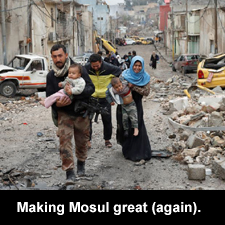 I didn’t want to let the week go by without saying something about the hundred-plus killed in a coalition raid in Mosul. Civilian deaths have been on the rise in that conflict since our military began its air assault on the more densely populated western side of Mosul. Well, that’s predictable enough. We are fighting the legacy of the previous decade’s catastrophic policy, which was itself a response to another previous decade’s catastrophic policy, and so on. ISIS or ISIL is Al Qaeda in Iraq 2.0, drawing on ex Baathist military personnel for many of its cadres, as well as disaffected Sunni youth, targeted by both the U.S. and the Baghdad government. The destruction/”liberation” of Mosul will not change the fundamental problems that prompted these people to turn, in desperation, to the extremists they once fought against.
I didn’t want to let the week go by without saying something about the hundred-plus killed in a coalition raid in Mosul. Civilian deaths have been on the rise in that conflict since our military began its air assault on the more densely populated western side of Mosul. Well, that’s predictable enough. We are fighting the legacy of the previous decade’s catastrophic policy, which was itself a response to another previous decade’s catastrophic policy, and so on. ISIS or ISIL is Al Qaeda in Iraq 2.0, drawing on ex Baathist military personnel for many of its cadres, as well as disaffected Sunni youth, targeted by both the U.S. and the Baghdad government. The destruction/”liberation” of Mosul will not change the fundamental problems that prompted these people to turn, in desperation, to the extremists they once fought against.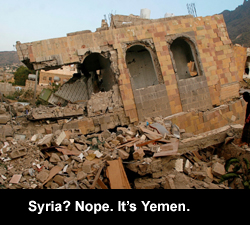 The United States has had dogs in this fight for years, despite what you’ll hear on bullshit broadcast outlets like Morning Joe. They have provided covert support to rebel groups in Syria since before the uprising, so there’s little doubt that some of those fighters assumed – as Chalabi did with regard to Iraq – that Uncle Sam would swoop in and save the day, Kosovo style. The notion that the United States could somehow fix this problem through the application of military force has remarkable currency among politicians, pundits, and talking heads.
The United States has had dogs in this fight for years, despite what you’ll hear on bullshit broadcast outlets like Morning Joe. They have provided covert support to rebel groups in Syria since before the uprising, so there’s little doubt that some of those fighters assumed – as Chalabi did with regard to Iraq – that Uncle Sam would swoop in and save the day, Kosovo style. The notion that the United States could somehow fix this problem through the application of military force has remarkable currency among politicians, pundits, and talking heads. I could sit here an write about the obviously outrageous statements made by Trump over the 90 minute program, but you’ve probably heard enough of that. Suffice to say that the guy proves his unsuitability for the office of the presidency every time he opens his big yap. No one should need additional convincing, but alas … this is America. No, what astonishes me is some of what gets discussed (and what doesn’t get discussed) in the wake of these debates. That in itself is enough to make you want to rip your own head off. Take Syria. On MSNBC’s Morning Joe, it’s pretty much a consensus that the Syrian conflict is a failure of the Obama administration on the scale of Bush’s Iraq invasion. Scarborough himself regularly refers to the conflict with terms like “holocaust” and “genocide”, which is frankly offensive.
I could sit here an write about the obviously outrageous statements made by Trump over the 90 minute program, but you’ve probably heard enough of that. Suffice to say that the guy proves his unsuitability for the office of the presidency every time he opens his big yap. No one should need additional convincing, but alas … this is America. No, what astonishes me is some of what gets discussed (and what doesn’t get discussed) in the wake of these debates. That in itself is enough to make you want to rip your own head off. Take Syria. On MSNBC’s Morning Joe, it’s pretty much a consensus that the Syrian conflict is a failure of the Obama administration on the scale of Bush’s Iraq invasion. Scarborough himself regularly refers to the conflict with terms like “holocaust” and “genocide”, which is frankly offensive. Restored Right to Choose. The Whole Women’s Health decision by the Supreme Court has moved the needle in a positive direction on the abortion issue for the first time in many years. I’m hoping that this is the death knell for this generation of TRAP (targeted restrictions on abortion providers) laws taking hold across the country over the past few years. What the anti-choice crowd will try next is anyone’s guess. Another example of why, on the basis of the Supreme Court alone, it is well worth bothering to get out and vote the right way this fall. Just saying.
Restored Right to Choose. The Whole Women’s Health decision by the Supreme Court has moved the needle in a positive direction on the abortion issue for the first time in many years. I’m hoping that this is the death knell for this generation of TRAP (targeted restrictions on abortion providers) laws taking hold across the country over the past few years. What the anti-choice crowd will try next is anyone’s guess. Another example of why, on the basis of the Supreme Court alone, it is well worth bothering to get out and vote the right way this fall. Just saying.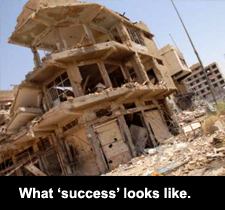 Today, the Baghdad government is ripping Fallujah yet another new asshole. It’s worth recalling that the ISIS militants they are fighting in that unfortunate city are mostly disaffected Sunnis, the most senior of which were probably part of Saddam’s army, the younger ones simply kids with no future, like so many Gazans or West Bank Palestinians. Malcolm Nance reminds us that, prior to our 2003 invasion, there were no Al Qaida to speak of in Iraq; after the invasion, they numbered in the low thousands. It wasn’t until the utter failure of the post-invasion regime to incorporate Sunnis into society (and, yes, the arrest and disappearance of many at the hands of the Iraqi security forces) that these young people became fodder for opportunistic Salafi organizations like ISIS.
Today, the Baghdad government is ripping Fallujah yet another new asshole. It’s worth recalling that the ISIS militants they are fighting in that unfortunate city are mostly disaffected Sunnis, the most senior of which were probably part of Saddam’s army, the younger ones simply kids with no future, like so many Gazans or West Bank Palestinians. Malcolm Nance reminds us that, prior to our 2003 invasion, there were no Al Qaida to speak of in Iraq; after the invasion, they numbered in the low thousands. It wasn’t until the utter failure of the post-invasion regime to incorporate Sunnis into society (and, yes, the arrest and disappearance of many at the hands of the Iraqi security forces) that these young people became fodder for opportunistic Salafi organizations like ISIS. Capitalism’s Failure. This is an issue that touches on everyone, young and old, working and unemployed or retired, poor and not-so-poor. The internal contradictions of American and, by extension, global capitalism came to a head in the crash of 2008, and we are still living in the aftermath of that disaster. Yes, the government can point to select data points that indicated a modest level of recovery, but the fact remains that an economic system that has consistently failed the vast majority of the population over the past 30 years has entered into an entirely new phase of failure. Most working Americans are toiling at the only job they can find, earning an inadequate rate of compensation. Our major cities are choked with legions of homeless people. This system is broken; it only serves the top one percent. We need to take a hard look at this, sooner rather than later.
Capitalism’s Failure. This is an issue that touches on everyone, young and old, working and unemployed or retired, poor and not-so-poor. The internal contradictions of American and, by extension, global capitalism came to a head in the crash of 2008, and we are still living in the aftermath of that disaster. Yes, the government can point to select data points that indicated a modest level of recovery, but the fact remains that an economic system that has consistently failed the vast majority of the population over the past 30 years has entered into an entirely new phase of failure. Most working Americans are toiling at the only job they can find, earning an inadequate rate of compensation. Our major cities are choked with legions of homeless people. This system is broken; it only serves the top one percent. We need to take a hard look at this, sooner rather than later. This is what happens in America when anything like a foreign-inspired terror attack takes place: we want to corral all Muslims and start bombing some country most of us couldn’t find on a globe with both hands. I’ve lived through many cycles of this, from the Iran hostage crisis through the first gulf war, to the embassy bombings in the late 1990s and on into the 9/11 era. I can remember a Muslim friend from Bosnia being a bit taken aback by the rhetoric and the kind of full-on nationalism pushed through the corporate media that came about after Clinton bombed Iraq in 1998. It’s times like these when Muslims – and yes, people with beards and headscarves more generally – feel compelled to start looking over their shoulders.
This is what happens in America when anything like a foreign-inspired terror attack takes place: we want to corral all Muslims and start bombing some country most of us couldn’t find on a globe with both hands. I’ve lived through many cycles of this, from the Iran hostage crisis through the first gulf war, to the embassy bombings in the late 1990s and on into the 9/11 era. I can remember a Muslim friend from Bosnia being a bit taken aback by the rhetoric and the kind of full-on nationalism pushed through the corporate media that came about after Clinton bombed Iraq in 1998. It’s times like these when Muslims – and yes, people with beards and headscarves more generally – feel compelled to start looking over their shoulders.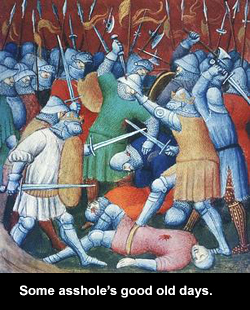 It’s hard for me to see how these calls for military action and pulling up the drawbridge aren’t simply appeals to cowardice. Seriously – the vast majority of the loudest hawks and anti-immigrant fanatics are also fierce defenders of an over-broad interpretation of the 2nd Amendment. Given that many, many more Americans are killed by heavily armed family members, neighbors, or strangers than by terrorism, this is an almost astonishing level of hypocrisy. Even more disturbing is the ludicrous background assumption, expressed most consistently on Morning Joe and by career hawks like John McCain, that if we had simply invaded Syria in 2012, all would be sweetness and light in that sorry nation today. Is there any factual basis for that assumption? The question never arises.
It’s hard for me to see how these calls for military action and pulling up the drawbridge aren’t simply appeals to cowardice. Seriously – the vast majority of the loudest hawks and anti-immigrant fanatics are also fierce defenders of an over-broad interpretation of the 2nd Amendment. Given that many, many more Americans are killed by heavily armed family members, neighbors, or strangers than by terrorism, this is an almost astonishing level of hypocrisy. Even more disturbing is the ludicrous background assumption, expressed most consistently on Morning Joe and by career hawks like John McCain, that if we had simply invaded Syria in 2012, all would be sweetness and light in that sorry nation today. Is there any factual basis for that assumption? The question never arises.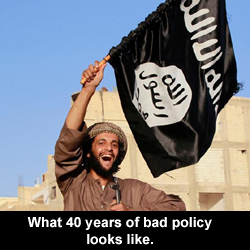 The trouble with approaching these issues with an imperial mindset is that we are blind to our own failures while expressing righteous indignation over the failings of others. Russia’s military action in Syria is a good example. They are perhaps the fifth or sixth power to drop bombs in that unfortunate country. Their strategy, while militaristic and morally bankrupt, is not difficult to understand – they view Islamic radicalism as an extreme threat, and they make the not unrealistic assumption that the fall of Syria’s government would result in a failed state something like Libya or Somalia or Iraq (all of which are beneficiaries of our aforementioned bellicosity). So, like the U.S.’s support of Saudi’s murderous campaign in Yemen, they are applying force in support of Assad’s crumbling regime.
The trouble with approaching these issues with an imperial mindset is that we are blind to our own failures while expressing righteous indignation over the failings of others. Russia’s military action in Syria is a good example. They are perhaps the fifth or sixth power to drop bombs in that unfortunate country. Their strategy, while militaristic and morally bankrupt, is not difficult to understand – they view Islamic radicalism as an extreme threat, and they make the not unrealistic assumption that the fall of Syria’s government would result in a failed state something like Libya or Somalia or Iraq (all of which are beneficiaries of our aforementioned bellicosity). So, like the U.S.’s support of Saudi’s murderous campaign in Yemen, they are applying force in support of Assad’s crumbling regime.